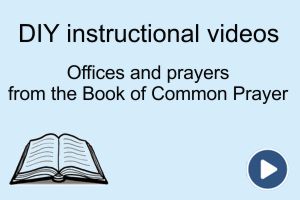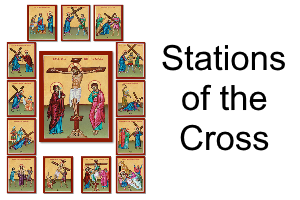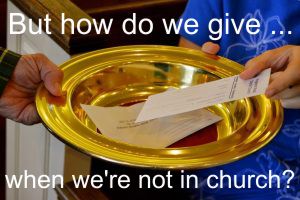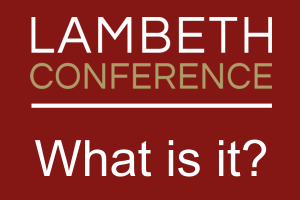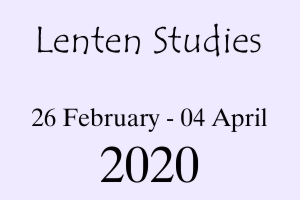DIY instructional videos on how to say the daily offices, family prayers, the Litany and Compline from the Canadian Book of Common Prayer.
by the Rev'd Canon Ross Hebb
Category Archives: Formation
Stations of the Cross – Video and Photos
Visit the Cathedral at Noon on Fridays during Lent to participate in Stations of the Cross, and find two different meditations here on our website.
Here is a video of the Stations of the Cross at the Cathedral, filmed in 2020.
The depiction of the Stations of the Cross below features photos of the stations in the Cathedral, with text adapted from The Stations of the Cross for Kids, which we have used in the past. The video above contains alternate meditations. There are many different versions of the Stations of the Cross. Try a different one each Friday!
The First Station: Jesus Is Condemned to Death
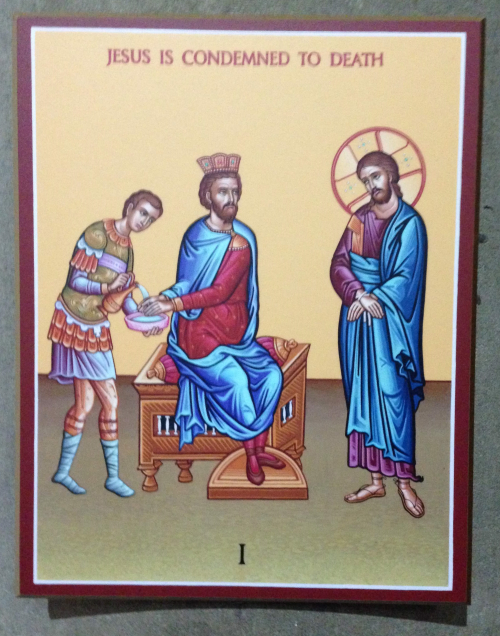
Jesus was alone.
Jesus had done only good things in life.
Jesus had to be put to death.
The procession was ready.
The gates were opened.
The soldiers lead the way.
Jesus followed.
Dear Jesus, you stood all alone before Pilate. Nobody speaks up for you. Nobody defends you. Sometimes I feel alone. Sometimes I feel afraid. Sometimes I feel like I am treated unfairly. Help me to accept unfairness and not complain. Help me pray for those who have hurt me.
Almighty Father, many times people don't seem to understand me. Sometimes they are unfair. You accept me when I make mistakes. Help me to accept others when they make mistakes. Help me to forgive as Jesus did. This I ask through Christ, our Lord. Amen.
The Second Station: Jesus Accepts His Cross
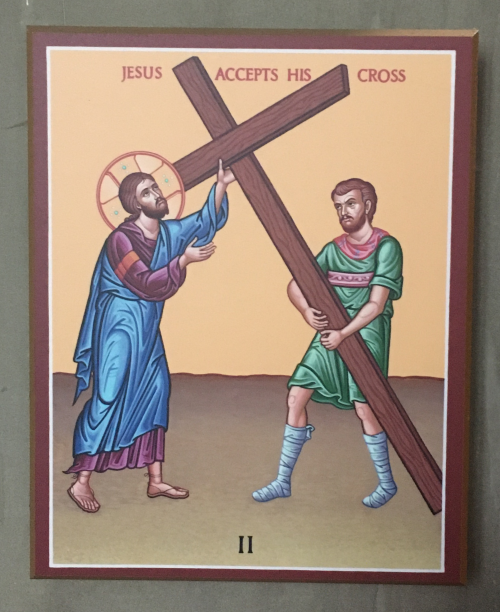
Pontius Pilate did not want to crucify Him.
He tried everything he could think of to change the crowd's mind but nothing worked.
He washed his hands in front of the crowd saying, "This is a righteous man."
He gave Jesus to the soldiers to be crucified.
Dear Jesus, you carried your cross. You knew it wouldn't be easy, but you carried it just the same. Sometimes I get upset with the troubles that I have. Sometimes I get upset when people ask me to do things for them. I don't want to carry my cross. Give me the courage to carry my cross as You did.
Almighty Father, Jesus carried his cross without complaint. When I am tempted to complain, help me to remember Jesus and the cross he carried for me. This I ask through Christ Our Lord. Amen.
The Third Station: Jesus Falls the First Time
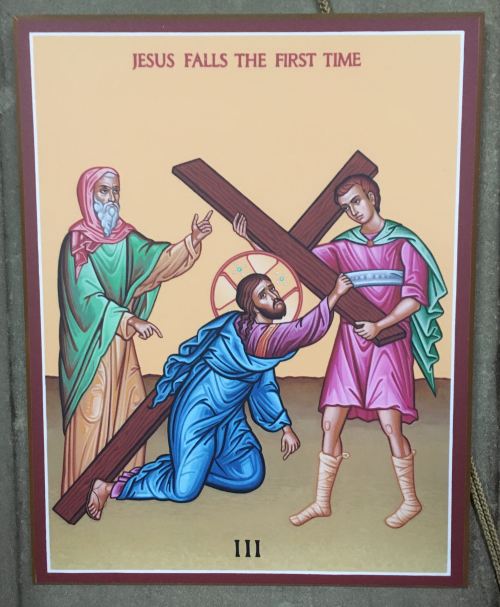
Jesus was unsteady on his feet.
The soldiers were pushing Him.
Jesus is tired. He can hardly carry the cross. He fell.
The soldiers yanked him up.
The procession is moving again.
Dear Jesus, sometimes I don't pay attention to what I should be doing. When things get hard for me, sometimes I give up. Your cross was so heavy. It was hard for you. You never gave up. You fell, but you got up and moved on. Help me to get up when I fall and keep moving.
Almighty Father, I know there are many times when I give up before I should. When I fall, help me get up again and keep going. This I ask through Christ Our Lord. Amen.
The Fourth Station: Jesus Meets His Sorrowful Mother

There he was in front of her. The cross was so heavy, he was trembling. His body was bleeding. His mother tries to get closer to him. He tries to get closer to his mother but the soldiers pushed him away.
The procession moves on.
Dear Jesus, help me to see those around me who love me. Help me to understand that I need them as much as they need me.
Almighty Father, when I feel alone, help me to remember to turn to my parents for help and most of all, to you. This I ask through Christ Our Lord. Amen.
The Fifth Station: Simon Helps Carry the Cross
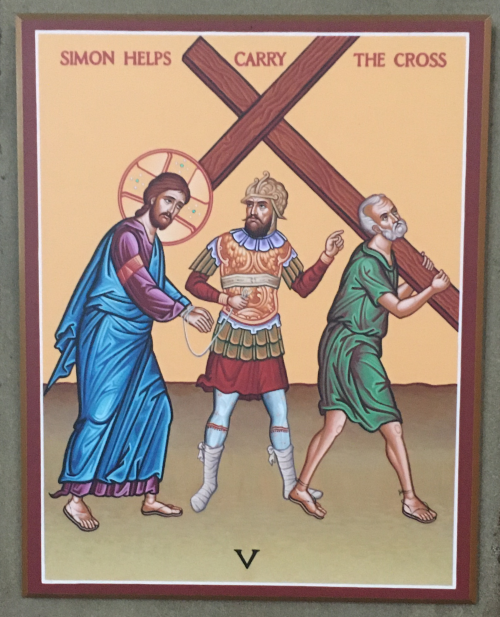
A soldier pushes Simon toward Jesus telling him to carry the cross. Simon saw Jesus was bruised and bleeding and quickly picked up the cross. He carried it for Jesus. They moved on with Jesus following Simon.
Dear Jesus, sometimes I pretend not to hear when my parents call me. I leave when I know others could use my help. You gave help to everyone. When you needed help, you accepted it. Help me to give and accept help.
Almighty Father, help me to be a friend to friendless. Help me to help the needy. This I ask through Christ Our Lord. Amen.
The Sixth Station: Veronica Offers her Veil to Jesus
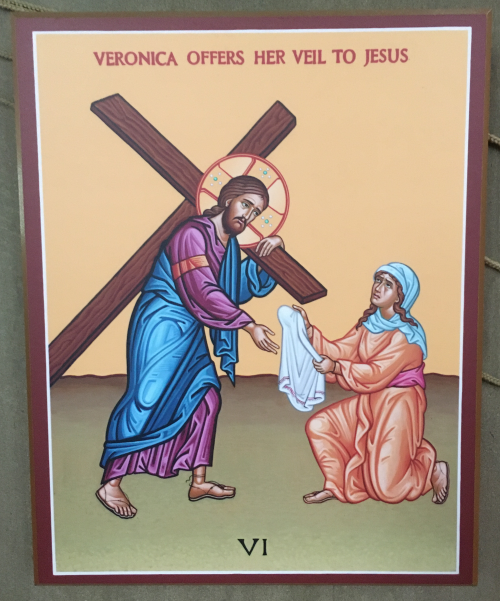
She wanted to comfort Jesus in any way she could.
She gently wiped his face.
The soldiers roughly pushed her back.
They continued along their way.
Dear Jesus, there are times when I see someone that is being picked on. There are times when I see someone that is sad. Just as Veronica wiped your face to comfort you, help me to always help others in whatever way I can.
Almighty Father, help me to see the needs of others. Remind me to be helpful, even if I am not asked. This I ask through Christ Our Lord. Amen.
The Seventh Station: Jesus Falls the Second Time
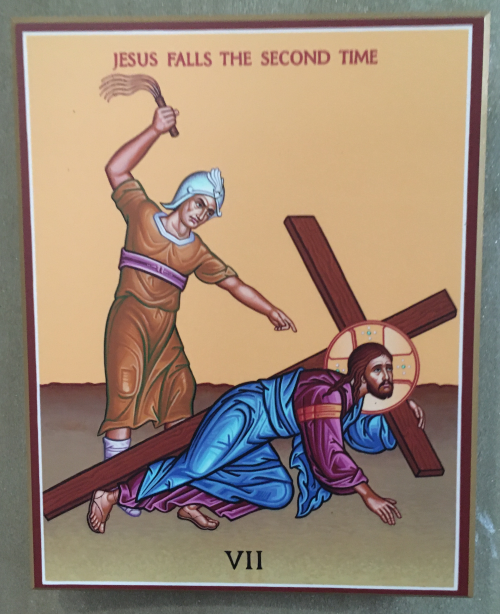
Jesus is getting weaker.
Jesus falls.
Jesus struggles to get up.
He tries until He makes it to his feet.
He moves on.
Dear Jesus, you didn't give up. Sometimes when things get hard for me, it's hard to keep trying. I want to quit. When things get hard for me, help me to get up and keep going as you did.
Almighty Father, help me to keep trying when things get hard and when I fall. Help me not to give up. This I ask through Christ Our Lord. Amen.
The Eighth Station: Jesus Speaks to the Women of Jerusalem
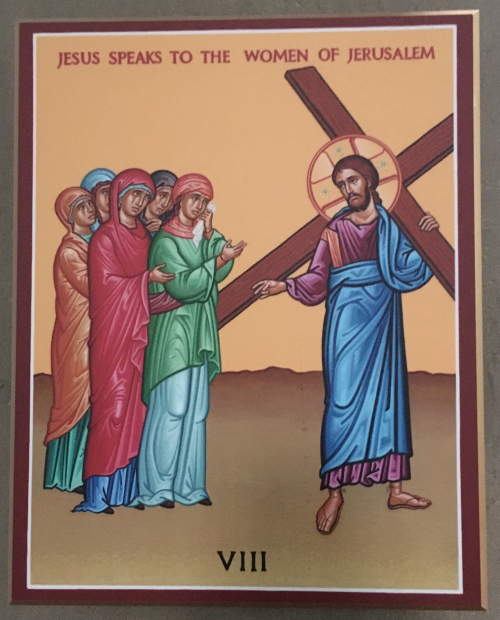
He knew they were sad.
He stopped and talked to them.
Even at this terrible time, Jesus was not thinking of himself, he was thinking of all of us.
Dear Jesus, you stopped to help those in need. I get selfish at times and think only of myself. Help me to reach out to others as you did. Help me to see the needs of others and put their needs above mine.
Almighty Father, help me not to be hurtful or selfish. Help me to see the needs others have even when I have problems of my own. This I ask through Christ Our Lord. Amen.
The Ninth Station: Jesus Falls the Third Time
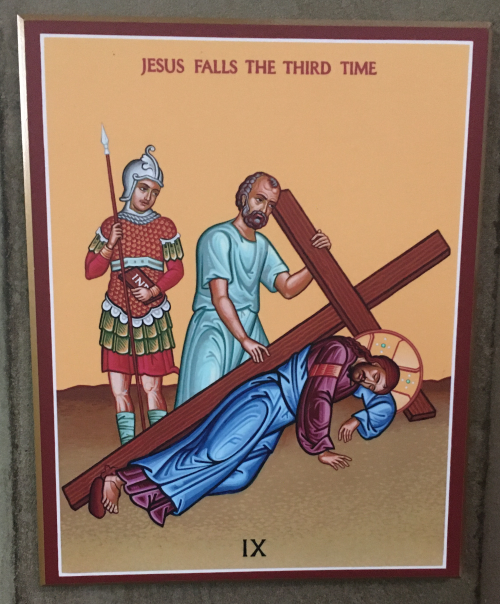
Jesus falls once more.
They laugh at him.
He gets up, steadies himself and walks the last few yards to the Place of the Skull.
Dear Jesus, help me to see that nothing is greater than you. Nothing is greater than your love for me. Help me to see that with your help, I can do your Father's will.
Almighty Father, Thank you for sending Jesus to us. Help me to always follow Him. This I ask through Christ Our Lord. Amen.
The Tenth Station: Jesus Is Stripped of His Garments
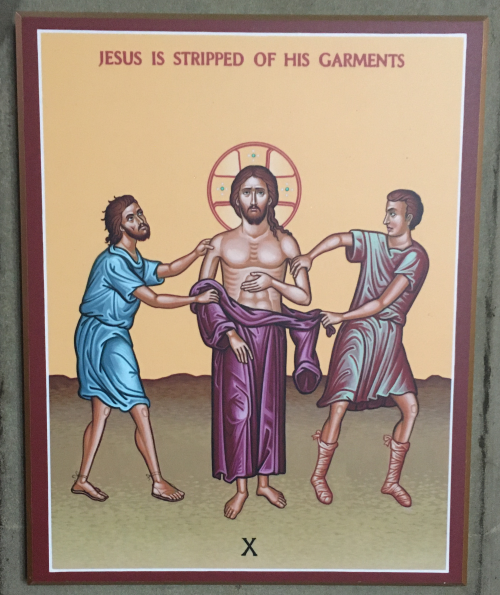
The soldiers remove his clothes, tossing them in a heap.
The soldiers didn't know what to do with his clothes.
They decided to throw dice for them.
Dear Jesus, You set an example of truth, humility and love. Help me to set a good example for others to follow.
Almighty Father, help me to always be respectful and follow the examples of Jesus. This I ask through Christ Our Lord. Amen.
The Eleventh Station: Jesus Is Nailed to the Cross

It was done. Jesus was nailed to the cross.
Dear Jesus, sometimes I say or do hurtful things to others. You stretched your arms of love on the cross. Help me to bring Your love to others and cause them no hurt.
Almighty Father, help me to follow your son and make his hands bleed no more through my fault. This I ask through Christ Our Lord. Amen.
The Twelfth Station: Jesus Dies on the Cross
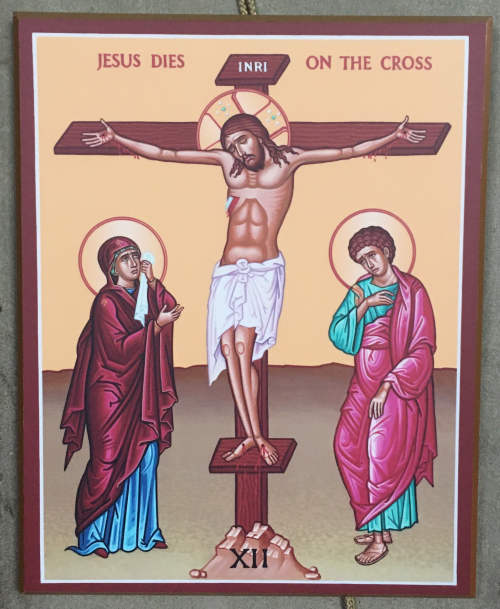
The cross was hoisted into place.
Mary and John stayed at the foot of the cross and prayed.
Jesus looked down and said to his mother "Dear woman, here is your son" and to John "Here is your mother."
Even at this terrible time, he was taking care of his mother.
The sky was dark.
Jesus said "I am thirsty". A soldier offered him wine mixed with vinegar.
The two thieves that were crucified beside Jesus talked to him. Looking at one of them Jesus said, "I tell you the truth, today you will be with me in paradise."
Jesus said, "EIi, Eli, lama sabachthani? - My God, my God, why have you forsaken me?"
Then he said "Father, into your hands I commend my spirit."
A few moments later He said, "It is finished."
He died.
At that instant, the earth shook, rocks split, the curtain in the temple ripped from top to bottom. The centurion guarding Jesus saw the earth quake and said "Surely he was the Son of God".
Jesus died at 3 p.m. on the Cross at Calvary.
Dear Jesus, death is hard for us to understand. Remind us always that faith will carry us through our losses.
Almighty Father, help me to understand Jesus' death. Help me to understand the love Jesus has for me. This I ask through Christ Our Lord. Amen.
The Thirteenth Station: Jesus Is Taken from the Cross
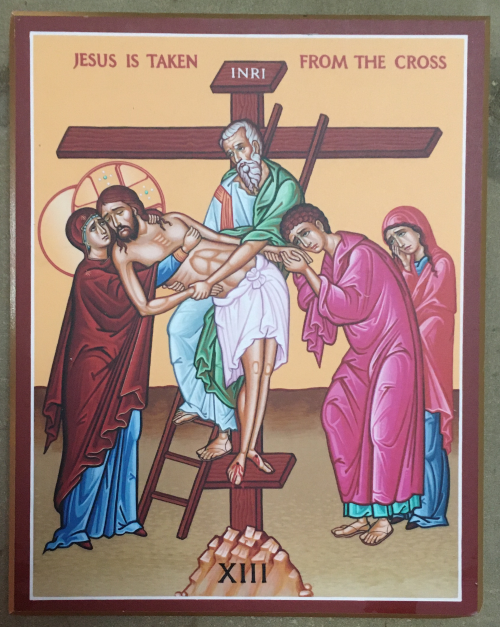
A soldier pierced the side of Jesus with his spear to be sure that he was dead.
The crowd hurried to their homes before the beginning of Sabbath or they would be excluded from the celebration.
Mary stayed under the cross with her son.
Two men came to the soldiers with orders from Pilate, Joseph of Arimathea, and Nicodemus. Joseph had offered his burial tomb for Jesus.
Jesus was gently removed from the cross.
Dear Jesus, how bad was your death but how gently you were removed from the cross. Help me to treat others kindly always.
Almighty Father, help me to be a kinder, gentler person. Help me to always see the good in others. This I ask through Christ Our Lord. Amen.
The Fourteenth Station: Jesus Is Laid in the Tomb
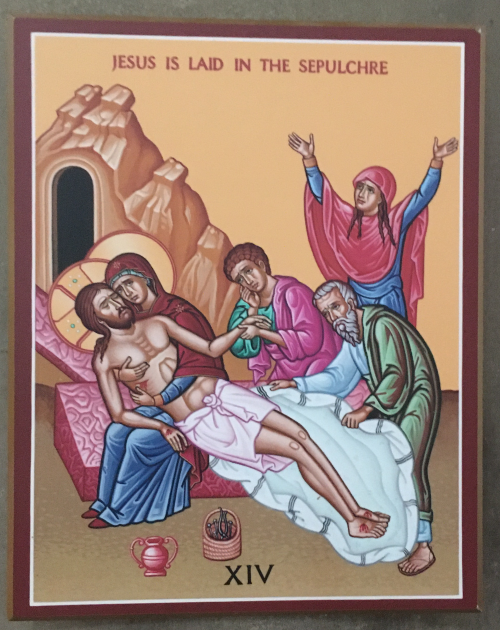
John, Joseph of Arimathea, Nicodemus, and Mary, went from Calvary to Jesus' burial tomb.
Joseph and John carried Jesus into the tomb.
They laid him on the rock bench in the burial chamber.
The men moved a big boulder in front of the entrance to block it.
Dear Jesus, help me to carry on your work.
Almighty Father, thank you for sending Jesus. Help me to be like Jesus. Help me to share my life and love more fully. This I ask through Christ Our Lord. Amen.
Why not connect with virtual Taizé?
The article below, originally written in April 2020, gives an overview of an online Taizé service. Virtual worship continues in 2022. Consult the Cathedral calendar for times.
Psalm 130:5 is comforting to read, but, in these strange times of self-isolation during a public health emergency, it's reassuring to see and hear someone familiar saying it aloud. That's what struck me as I listened to Rachel Schmidt sharing: “I wait for the Lord; my whole being waits, and in His word, I put my hope.”

More people connected to the virtual service than normally visit the cathedral for a half-hour of simple, meditative prayer and music in the Taizé tradition. Through words, music and silence, participants can focus on a single, burning candle and an icon or close their eyes to listen for the voice of God.
Cath Coombes and Leith Box attended virtually from Gagetown, NB, and thanked Kurt for making it possible, calling it “lovely.” They enjoyed the peaceful, thoughtful silence which followed a reflection written by German pastor Dietrich Bonhoeffer.
Bonhoeffer referred to chapter 8 of Mark's gospel in which the disciples are urged by Jesus to take up their cross and follow Him. He wrote that each person has his or her own cross ready, appointed and measured by God. For some, the sacrificial suffering will mean martyrdom; others will not be tempted beyond their strength, but a cross will be laid upon everyone committed to Jesus.
Participants pondered this theme, then joined in the prayers of the people and the Lord's Prayer, before closing with a Taizé-style song in Spanish, Nada Te Turbe. The words are attributed to St. Teresa of Avila, which is in Spain, a country whose citizens are currently being ravaged by COVID-19.
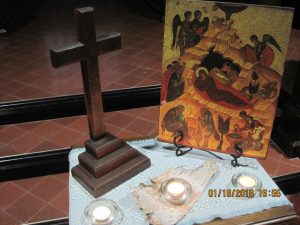
Retired bishop Bill Hockin and his wife Isabelle have attended in person previously, but found the virtual service – necessary because of social distancing rules laid down by the chief medical officer of health – very well done.
Isabel and Nathan Cutler, former cathedral members who now live in Newfoundland and Labrador, signed on and found the service “beautiful,” adding they hope to take part in future weeks during Lent through “this great tool.”
Kurt plans to offer virtual Taizé on future Thursdays during Lent. Instructions for how to sign on to the Zoom meeting will be posted on the cathedral calendar and Facebook page the day prior. A person with a web camera or a forward-facing camera, as well as a microphone, will get the most out of the technology. But a reliable Internet connection will get you there, too. Even if you cannot be seen or heard, you will see and hear everything that is happening.
-- by Ann Deveau
Who Would Have Thought?
Full confession: The first time I sent a fax, I was totally in awe. My best friend was on holiday in Scotland and we had just had a fax machine installed in our office. The very idea that she was receiving my words at the same time as I was pressing that button… Well, let's just say it was a moment in time for me.
Fast forward to last Thursday evening. The fax machine awe returned in spades! Our Bible study group face timed our entire study! It took me awhile to brave going from audio to video but I did it and what a great discussion we had! Contrary to the idea that we might talk over each other, being able to see faces made all the difference. It was like being in the same room, except we weren't! But what a nice feeling to actually see those faces!
From that experience, I have concluded that video chats with my family and friends are going to become part of my routine. There is comfort in seeing that face that you love and the many expressions that cross it during a conversation. The telephone is OK but if you have the technology, I encourage you to step outside the box and tap the video button. It's a little intimidating seeing yourself but the gift of seeing everyone else makes it all worthwhile.
We are all in this together so let's use the technology to be together when we can't!
By the way, it was really nice being at Church with 118 of you and thanks to everyone who made that possible!
-- Gail McGillivray
But how do we give … when we’re not in church?
Health concerns in light of the current global viral pandemic (March 2020) and, the Cathedral's response, will influence to some degree who we see in worship over the next little while. At Christ Church Cathedral, we’ll be doing all we can to cooperate with the wider community and attempt to strike the right balance between safety and assuring health for all both spiritual and physical as our top priority. That will include encouraging all to make wise decisions, for the sake of their own health and that of others. We do not wish to unnecessarily impose obligation on those who are not comfortable being in public right now.
During this time of a self imposed regulating of physical contact, Cathedral Staff will continue on duty and, unfortunately, bills will continue to be paid. So, how do we give when we’re not at worship?
take advantage of the convenience and regularity of e-offering
For about half of the 200 or so of our regular contributors, the answer is an easy one. Those who take advantage of the convenience and regularity of e-offering will need not do anyhing different. For the rest of us, there are options.

2. Give through our online giving provider CanadaHelps. From the secure Cathedral profile page (the Give Now! link on Facebook or linked from our website), making a donation is no more difficult than other online transactions, possibly more secure than many. Receipts are returned immediately by email.
3. Hand deliver or surface mail your offering to the Cathedral Office, 168 Church Street, Fredericton NB E3B 4C9. We’re open 9:00 a.m. to 3:30 p.m. Monday to Friday. If it happens that someone isn’t in the office, slip your mail under the office door or through the outside mail slot.
We want to do everything we can to make consistant giving as easy as possible. Contact the Office (506) 450-8500 if you have a question. Your Church Family will thank you for your efforts to stay current in your commitment of financial support. Quite literally, we all benefit!
The Lambeth Conference – What is it?

Archbishop Justin Welby
While not a governing body of the Church, per se, (being neither Synod nor Council), the Lambeth Conference is a significant moment for the Anglican Communion, drawing together spiritual leaders from around the world about once every decade since the mid 1800's.
Lambeth is scheduled for this year - 22 July - 02 August 2020.
The Lambeth Conference has always discussed church matters and issues of global concern, including: the persecuted church, refugees, faith and order issues, marriage, the family, human sexuality, the ministry of women, racism, war and peace, Christian ethics and the Christian way of life.
The Lambeth Conference dates back more than 150 years; the first was held in 1867 with 76 bishops present and has happened about every 10 years since.
- The Lambeth Conference in 2020 will welcome over 1000 active bishops and spouses from across the Anglican Communion.
- In the 1860s a dispute in South Africa prompted Canadian bishops to petition the Archbishop of Canterbury, Charles Longley, to call a gathering of senior leaders.
- Fourteen Lambeth Conferences have met since, about every 10 years, with breaks during the two World Wars.
the Lambeth Conference dates back more than 150 years
Despite having no legal powers, Lambeth Conferences gradually gained respect and influence. Christian unity was addressed from the outset. The pastoral letter signed at the end of the first Conference declared Anglicanism was part of something bigger. It began, “We, the bishops of Christ’s Holy Catholic Church…” The ‘Chicago-Lambeth Quadrilateral,’ approved at the conference of 1888, remains the Anglican statement of the fourfold essential basis for a reunited Church.
Find out more about the Lambeth Conference
Website of the Archbishop of Canterbury
The First Lambeth Conference and Medley's Charge of 1868, Lenten Studies 2009, Canon Ross Hebb
Faith Alive! Deep Dive
Some are asking: What is a "Faith Alive! Deep Dive?"
Faith Alive! is our Cathedral programme of preparation for confirmation, reaffirmation of faith or reception into the Anglican Church. Both "classes" and "sessions" with participants and their mentors comprise the programme content. Specifically, the classes are opportunities when all meet on a Wednesday evening for a meal and some teaching by various individuals on the various topics.
The "Deep Dive" is being offered by the Dean during Lent as one of our Cathedral Lenten Study options in 2020, 1:00 p.m. on Wednesdays in the Formation Room at the Memorial Hall. The Deep Dive is for anyone, Faith Alive! participant or not, who would appreciate some extended, more detailed focus on the class topics. The extra attention will allow for more smaller gourp conversation and dialogue and are open to anyone who has interest in one or any of the topics.
Ash Wednesday, 26 February 2020 - "Worship and Prayer"
Wednesday, 04 March 2020 - "The Holy Bible"
Wednesday, 11 March 2020 - "God/Creeds/Doctrines"
Wednesday, 18 March 2020 - "Ministry and Structure of the Church"
Wednesday, 25 March 2020 - "Rule/Ten Commandments"
Wednesday, 01 April 2020 - "Symbols, Sacraments and Seasons"
You're welcome to join us.
Lenten Studies 2020
During the Season of Lent, all members of the Cathedral congregation are encouraged to take part in small group study or reflection.
The 40 days of Lent are an excellent time to take on a discipline of deeper reflection on the Christian life, growing personally in discipleship as well as helping us grow as a community of Christian faith in the world.
Download, fill and save, print or email the registration
Living the Fifth ~ the Fifth Mark of Mission is: to strive to safeguard the integrity of creation and sustain and renew the life of the earth. The online webinar from Queen’s College, Newfoundland, will explore the three themes. Wednesdays: 3-4 pm 04 and 18 March; 03 April
Liturgy of the Ordinary ~ Two groups offering a series of reflections on this diocesan-recommended text urging becoming aware of God's presence in overlooked moments and routines. Mondays, 2:30 p.m. OR Thursdays, 7:00 p.m.
More Monk-y Business ~ The Roots of Western Monasticism conceived as a 'sequel' to the series last Lent on the Desert Mothers and Fathers, will further explore the development of monasticism in western Europe, legacies of prayer and discipline. Mondays, 6:30 p.m.
Faith Alive! Deep Dive ~ Conversations on class (or session) topics from “Faith Alive!” – the Confirmation, Reaffirmation or Reception preparation programme now underway. Wednesdays, 1:00 p.m.
Parables: Scandalous Stories of a Saving Grace ~ exploration according to the book of the same title by Bishop Bill Hockin. Thursdays, 1:00 p.m.
Resources
Resources will be made available by the leaders of each of the studies. Contact the leaders directly to: express interest / ask a question / register, place the form on the offering plate or submit to the Cathedral office. Some flexibility in schedules and locations may be possible within given restraints.
Group Leaders
Mark Nichols, Creation Car Animator (Eastern Nfld and Labrador) Webinar link
Kurt Schmidt <formation at christchurchcathedral.com> (506) 259-3711
Alan Sears <asears at unb.ca> (506) 450-9971
Geoffrey Hall <dean at christchurchcathedral.com> (506) 450-7761
Harry Palmer and Keith Radford <radford at unb.ca> (506) 452-1793
Cheryl Jacobs <cajacobs84 at gmail.com> (506) 459-5795
Five opportunties at six different times
“Living the Fifth” Online webinar format
Wednesday, 04 March - 3-4 p.m. “A missional calling”
Wednesday, 18 March 3-4 p.m. “A communal calling”
Wednesday, 01 April 3-4 p.m. “A personal calling”
Open the link in your web browser to join Mark Nichols
“Liturgy of the Ordinary” Charis Group
Mondays 2:30 - 4:00 p.m.
Cathedral Hall Lounge Harry Palmer/Keith Radford
More Monk-y Business
Mondays 6:30 - 7:30 p.m
Cathedral Hall Formation Room Kurt Schmidt
Faith Alive! Deep Dive
Wednesdays 1:00 - 2:15 pm
Cathedral Hall Formation Room Geoffrey Hall
Parables: Scandalous Stories/Saving Grace
Thursdays 1:00 - 2:00 p.m.
Cathedral Hall Formation Room Alan Sears
"Liturgy of the Ordinary” Home Study
Thursdays 7:00 - 8:30 p.m.
Jacobs’ Residence Cheryl Jacobs
Please register by completing the form, place it on the offering plate or email to Kurt Schmidt.
Christianity Through a Worldview Lens – February 2020
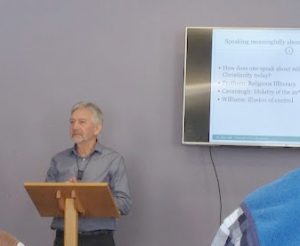
We live in an age of science, logic and reason. This is a time when religion and religious faith are struggling to be recognized to have a voice in a context where dimensions of reality, existence and meaning -- the "big" questions -- are disregarded.
John noted that his presentation was drawn from a more lengthy treatment of the subject in his paper with the same title: "Christianity Through a Worldview Lens." His insights are enlightening and descriptive of the challenge religious faith is experiencing. John's perspective is ultimately of great value and importance.
Read "Christianity Through a Worldview Lens" here
GMH
Growing in Giving – top ten truths
About Biblical Giving
1. The Tithe Is the First 10 Percent
"Set apart a tithe of all the yield of your seed that is brought in yearly from the field." (Deuteronomy 14:22) Few of us bring in a yield from the field these days. But a "yield" we do possess.
Wondering how to calculate your tithe? It's easy! The tithe is the first 10 percent of your gross income—before any expenses or obligations, including taxes. Find out that number for the year, month or weeks and move the decimal point one place to the left. How do we know? God says, "Honour the Lord with your substance and with the first fruits of all your produce." (Proverbs 3:9). The Merriam-Webster Dictionary defines firstfruits as "the earliest gathered fruits offered to God in acknowledgment of the gift of fruitfulness" (See also Genesis 28:22; Leviticus 27:32; Hebrews 7:2, 4).
There's something spiritually significant about giving God our first and best, rather than the leftovers. And it means something to him, too. In Malachi 1:6-12, some of the priests at the Temple got a bright idea. Instead of offering unblemished animals as sacrifices to the Lord, they decided to make sacrificing more convenient and cost-effective. So, they began encouraging people to give their blind and lame animals, instead of the best of the bunch. The priests were giving God the leftovers instead of the first and best. In response, God said, "Where is the honour due to me? And if I am a master, where is the respect due to me? says the Lord of hosts." (Malachi 1:6). God viewed the practice as dishonouring him—because it was!
When God gave his first and only Son as a sacrifice for our sins, he gave his first and best. He deserves nothing less from us.
2. The Tithe Belongs to God
"Give therefore to the emperor the things that are the emperor's, and to God the things that are God's." (Matthew 22:21)
Some people get very defensive when a church leader talks about the tithe. "All they want is my money!" they'll say. That kind of attitude comes from a spirit of fear and judgment, and it is outside of the walk of love we are called by God to make our way of living. Most pastors are trying to help others understand the principle of tithing for their own benefit! But the real question isn't about whether or not a pastor is trying to get your money—it's whether we understand that the tithe belongs to God.
Is God really of first importance in our lives? If he is, there won't be such strong opposition to the idea of giving him our first and best. Scripture says, "All tithes from the land, whether the seed from the ground or the fruit from the tree, are the Lord's; they are holy to the Lord." (Leviticus 27:30).
In other words, when we tithe, we aren't giving our money to a pastor or a church—we're giving it to God. Certainly, it's important to be sure we are giving into good soil, but once we make that determination, our heart needs to release the tithe into God's hands for his purposes. If we don't, release it, there's no way around it—we're robbing God (Malachi 3:8). There is no blessing in robbing.
3. We Present Our Tithes to Jesus
"In the one case, tithes are received by those who are mortal; in the other, by one of whom it is testified that he lives." (Hebrews 7:8)
In the Old Covenant, the people presented their tithes to the high priest. Today, Jesus is the High Priest, so we present our tithes to him (Hebrews 4:14-16). That's why tithing isn't about money—it's about honour. We honour God with our tithe when we present our tithes to Jesus. How do we do this? First, we do it joyfully—we don't murmur. "God loves a cheerful giver." (2 Corinthians 9:7) Then, it becomes a deliberate act of worship.
"Honour the Lord with your substance and with the first fruits of all your produce; then your barns will be filled with plenty, and your vats will be bursting with wine." (Proverbs 3:9-10) So, every time we give—we present our tithe to the Lord with honour. That's the heart that leads to increase; that is the heart with which we tithe.
4. We Give Our Tithes in Faith
"And without faith it is impossible to please God, for whoever would approach him must believe that he exists and that he rewards those who seek him." (Hebrews 11:6)
If we tithe in fear—fear that we won't have enough left over, fear that we won't be able to make ends meet, fear that we won't get a return, fear that it won’t be used properly—we're not tithing in faith. And if we're not tithing in faith, we're not eligible to receive the benefits.
So, don't just tithe—tithe in faith! Do it believing that God will rebuke the evil one for your sake (Malachi 3:11) and that he'll open the windows of heaven over your life (Malachi 3:10). If we aren't tithing faithfully, our priorities are in the wrong place. Our priorities are in the temporal realm instead of the spiritual realm. And it's what's in the spiritual realm that will always bring us out of trouble and bring about abundant blessing.
Faith says, "We're going to tithe first." And faith knows God will take care of us in the meantime.
5. We Tithe Using Words
At harvest thanksgiving this year we read from Deuteronomy 26:2 "Take some of the firstfruits…. and say to the priest ...”
If we approach our giving as a matter of the heart, rather than just bucket-plunking, we'll not only begin to see it as an act of honour and worship, but an act of faith. Part of that act of faith is that we give using words.
In the Old Covenant, God's people would place the firstfruits of their increase—in a basket, present it to the high priest, and say to him, "Today I declare to the Lord your God that I have come into the land that the Lord swore to our ancestors to give us." (Deuteronomy 26:3). Redemption was being spoken.
For the Christian, Jesus is the High Priest. When we present our tithe to him, we should do so with our words, declaring the benefits and protections. Say out loud, "As I give, I believe the evil one is rebuked in my life, and the windows of heaven are opening up over every part of my life. As you give, it "... it will be given to you. A good measure, pressed down, shaken together, running over, will be put into your lap; for the measure you give will be the measure you get back." (Luke 6:38) And it is!
6. Giving the Tenth Protects the Other 90 Percent
"I will rebuke the locust for you, so that it will not destroy the produce of your soil; and your vine in the field shall not be barren, says the Lord of hosts." (Malachi 3:11)
Isn't it "the locust," which threatens to destroy, for no good purpose, that which we hold dear?
"I can't afford to tithe." Have you ever heard or said those words? You may have even thought, “When I can afford it, I'll tithe. “ Some of us may have been thinking that for 10 years, and we still don't think we can afford it. That should tell us something. What we're doing is not working.
Here's a simple truth about giving the 10 percent: Give God what is his, and he will protect what is yours. As you honour God with the 10 percent that belongs to him, he'll get involved with the rest. The other 90 percent will go further than ever before because you've got the generous heart God wants you to have when making financial decisions. Good financial decisions is what stewardship is all about. The majority of us don't make them. It’s the witness of every tither that the tithe given is never missed.
The tithe of our income belongs to God. It lays the foundation of our financial success and abundance. There’s a protection plan attached to the tithe.
If you're not a tither, you can look back in your life, and you can see where your fruit was destroyed, where your situation didn't work out, where your job didn't come to full fruition, where you weren't able to do what you intended to do. What's missing in all of that is assurance that we have invested in what really matters. Of one thing we can be assured, what we invest in the work of God matters and it is blessed. With that blessing also comes enormous blessing for us.
7. Tithing Is the Only Area of Life Where God Says "Test Me!"
"Put me to the test!" (Malachi 3:10)
This is God himself speaking, and God is saying, "Prove me in this." This is the only time in the whole of the Bible where God instructs us to test him, and it is the one area where most people have withdrawn from proving God. He tells us the evil one will be rebuked. "See if I will not open the windows of heaven for you and pour down for you an overflowing blessing." (Malachi 3:10-11) Have you ever tried to test God? Have you experienced a result? Why not?
Tithing is a lifestyle choice, not a hobby. A tither is a giver from the heart. So, don't just toss some money in a bucket and wait to see what happens. It is necessary to test the Lord with the giver's heart. That's when harvest comes. If we're not sowers we're not entitled to the harvest. Harsh reality. Vivid truth.
8. Tithing Is a Covenant Connection
"They have transgressed my covenant that I imposed on them. They have taken some of the devoted things; they have stolen, they have acted deceitfully, and they have put them among their own belongings. Therefore the Israelites are unable to stand before their enemies; they turn their backs to their enemies, because they have become a thing devoted for destruction themselves. I will be with you no more, unless you destroy the devoted things from among you." (Joshua 7:11-12)
Refusing to give based on Scripture's direction, disconnects us from the Covenant which blesses. When we tithe, we give God the legal right to intervene in our affairs, to bless us richly, and to defend us against the destruction the evil one brings.
Why should we wait until our back is against the wall? Why not begin now? Meditate on the blessings God's Word promises. Learn to act on the Word now, and when Satan tries to put you in a financial corner, failure will result. Live into the covenant of God and there will be little which can ultimately prevail.
9. God Created the Giving Heart for Our Benefit
"Honour the Lord with your substance and with the first fruits of all your produce; then your barns will be filled with plenty, and your vats will be bursting with wine." (Proverbs 3:9-10) Has that been quoted before?
Tithing isn't sowing—it's giving back to God what belongs to him. As a result, we will live in the overflow! That's the harvest. A good harvester is one who plans to give back what is already owned.
10. Our Giving Only Opens the Door to Blessing
"Then you ... with the aliens who reside among you, shall celebrate with all the bounty that the Lord your God has given to you and to your house." (Deuteronomy 26:11)
Being a wise and obedient steward of what God has given us is the least and the most that God requires of us. Perhaps it all begins with the proper handling of what belongs to God—the tithe. Tithing is an open door to the blessing that God set forth to bless us and keep us.

It's still the same for us today. If you've been thinking, “I believe in tithing but, I just can't afford it,” you're going backward. Because if you don't invite the blessing, you invite the curse.
These are 10 truths about giving. Is any of this magic or empty promises? Put these truths to work in your life—perceive them as the revelation they are—and just see if the result of God's promises don't increase. Are you hesitant to walk the life of a tither—take the plunge. Read the verses in scripture about giving, its central role in the walk of faith and, act on them. Start to tithe! Then, buckle your seatbelt and get ready for a truly exciting journey!
Scripture from the New Revised Standard Version Bible: Anglicized Edition, copyright © 1989, 1995 National Council of the Churches of Christ in the United States of America. Used by permission. All rights reserved worldwide.
Growing in Giving ... #1 - A Giving FAQ - What about stewardship? What about the tithe?
Growing in Giving ... #2 - What is a tithing (“demonstration”) Sunday?
Growing in Giving ... #3 - Principles of giving - a biblical quiz
Growing in Giving ... #4 - Top ten truths about biblical giving
